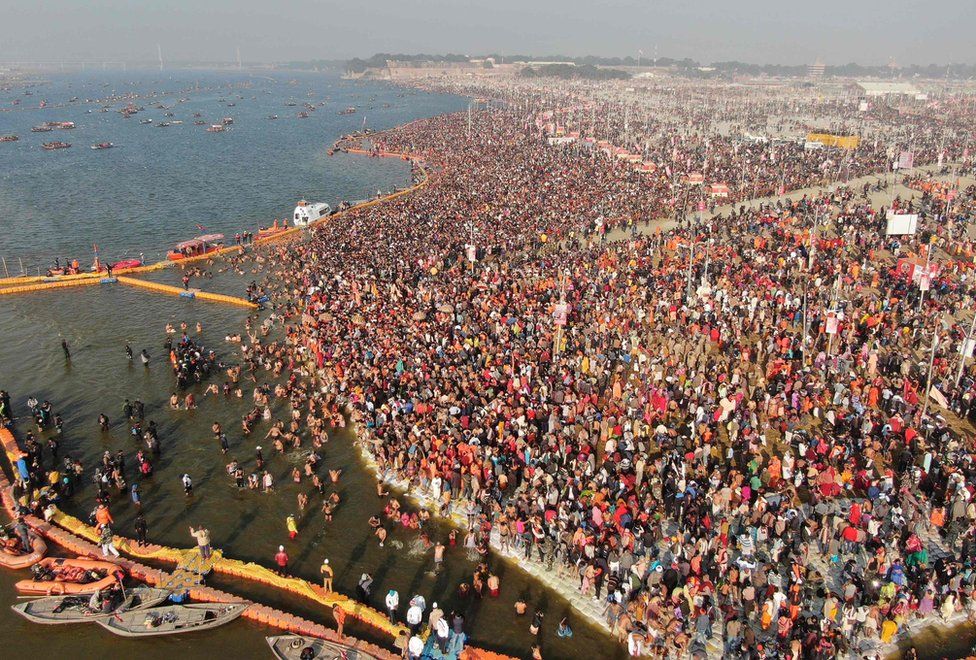Kumbh Mela: How to find someone lost at the world's biggest gathering

The ongoing Kumbh Mela festival in the northern Indian city of Allahabad (recently re-named Prayagraj) is billed as the largest gathering of humanity on earth, with 110 million people expected to attend over 49 days. But for the thousands who get lost among the crowds, help is at hand. The BBC's Geeta Pandey spent a day at the lost and found centres.
"Most people we get are elderly, mostly women above 60 years," says Umesh Tiwari who heads the Bhule Bhatke Shivir (lost and found camp), run by local charity Bharat Seva Dal.
Allahabad's oldest, this camp was set up by his father Raja Ram Tiwari in 1946 and has since helped reunite more than 1.5 million families.
At the entrance, a policeman writes down the details of the new arrivals in a register - their names, addresses, where they came from, any details of who to contact.
Inside, dozens of people who've been separated from friends or family are waiting anxiously. Some are sitting on rope cots inside the compound while others squat on the ground outside in the sun.
The atmosphere is fraught with tension. Anxious hours have been spent worrying over the fate of a loved one. There are tears and pleading voices: "Please announce my name [on the public address system] one more time."
Among them is a 35-year-old woman (who doesn't want to be named) with her eight-year-old daughter. The child is wrapped in a blanket because when they came in, she had no clothes on. "My husband and son had bathed and I accompanied my daughter to the bathroom. When we returned, we couldn't find them," she tells me.
Pilgrims at the mela bathe at the Sangam - the confluence of the Ganges, the Yamuna and the mythical Saraswati rivers. Hindus believe that doing so will cleanse them of their sins and help them attain "moksha", setting them free from the cycle of birth and death.
"We asked around and reached this place at 11am," says the woman. "We've been waiting here for several hours now and don't know what to do."
Her mobile phone, her handbag, everything is with her husband. The mother and the daughter don't remember any phone numbers and are uncertain how to find their way back home.
Some oversized clothes have been found to dress the child and repeated announcements have been made, but so far no one has come for them.
Mr Tiwari offers to give them money for bus fare, but they're not keen to travel after dark. "There's no last mile connectivity where I live. How will we reach home safely?" the woman asks. Mr Tiwari says they can stay the night in the tents at the camp.
As she sits fretting, weighing her options, one of the staff members comes in to say that her husband has arrived. Looking visibly relieved, the couple leave along with their daughter.
"On some days, the crowds are so thick that people easily get disoriented. We've received 560 people at our centre since the morning and 510 have been reunited with their families," Mr Tiwari says.
As dusk falls, the wait continues for the others. Among them is an elderly man who was separated from his wife in the morning. "Where is she now? Would she have had something to eat? She has no telephone and no money," he says, wiping away a tear.
"People think what could go wrong? But when adversity strikes, everything does and you can't do anything," says Mr Tiwari.
They have 25 volunteers who fan out across the mela grounds and bring in any one who appears lost. "It's god's will to separate or reunite people, my calling is to serve them. These people, the lost ones, are my god."
